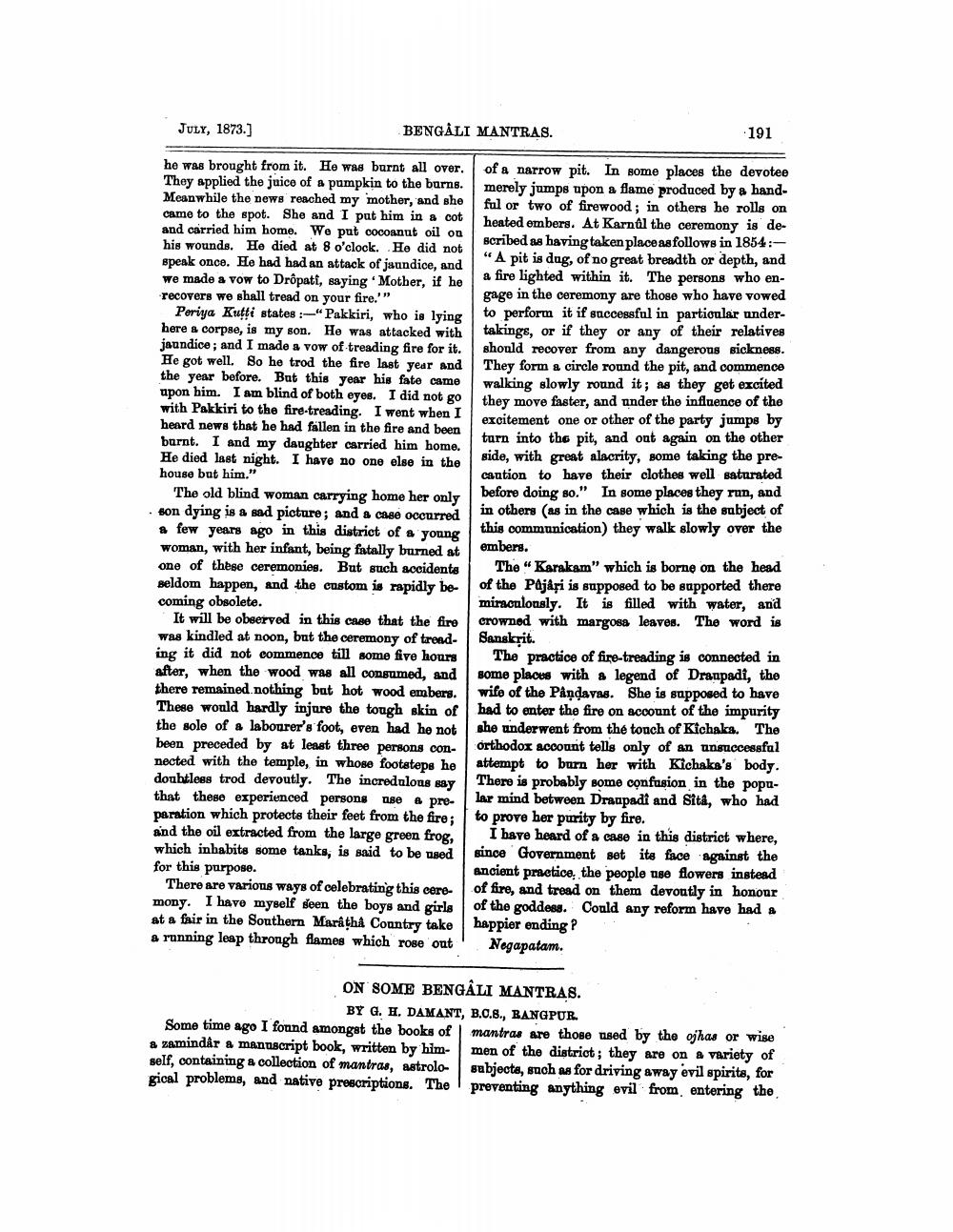________________
BENGALI MANTRAS.
JULY, 1873.]
he was brought from it. He was burnt all over. They applied the juice of a pumpkin to the burns. Meanwhile the news reached my mother, and she came to the spot. She and I put him in a cot and carried him home. We put cocoanut oil on his wounds. He died at 8 o'clock. He did not speak once. He had had an attack of jaundice, and we made a vow to Drôpati, saying 'Mother, if he recovers we shall tread on your fire.""
Periya Kutti states:-"Pakkiri, who is lying here a corpse, is my son. He was attacked with jaundice; and I made a vow of treading fire for it. He got well. So he trod the fire last year and the year before. But this year his fate came upon him. I am blind of both eyes. I did not go with Pakkiri to the fire-treading. I went when I heard news that he had fallen in the fire and been burnt. I and my daughter carried him home. He died last night. I have no one else in the house but him."
The old blind woman carrying home her only son dying is a sad picture; and a case occurred a few years ago in this district of a young woman, with her infant, being fatally burned at one of these ceremonies. But such accidents seldom happen, and the custom is rapidly becoming obsolete.
It will be observed in this case that the fire was kindled at noon, but the ceremony of treading it did not commence till some five hours after, when the wood was all consumed, and there remained nothing but hot wood embers. These would hardly injure the tough skin of the sole of a labourer's foot, even had he not been preceded by at least three persons connected with the temple, in whose footsteps he doubtless trod devoutly. The incredulous say that these experienced persons use e preparation which protects their feet from the fire; and the oil extracted from the large green frog, which inhabits some tanks, is said to be used for this purpose.
There are various ways of celebrating this ceremony. I have myself seen the boys and girls at a fair in the Southern Marâthâ Country take a running leap through flames which rose out
Some time ago I found amongst the books of a zamindar a manuscript book, written by himself, containing a collection of mantras, astrological problems, and native prescriptions. The
191
of a narrow pit. In some places the devotee merely jumps upon a flame produced by a handful or two of firewood; in others he rolls on heated embers. At Karnûl the ceremony is described as having taken place as follows in 1854:"A pit is dug, of no great breadth or depth, and a fire lighted within it. The persons who engage in the ceremony are those who have vowed to perform it if successful in particular undertakings, or if they or any of their relatives should recover from any dangerous sickness. They form a circle round the pit, and commence walking slowly round it; as they get excited they move faster, and under the influence of the excitement one or other of the party jumps by turn into the pit, and out again on the other side, with great alacrity, some taking the precaution to have their clothes well saturated before doing so." In some places they run, and in others (as in the case which is the subject of this communication) they walk slowly over the embers.
The "Karakam" which is borne on the head of the Pajari is supposed to be supported there miraculously. It is filled with water, and crowned with margosa leaves. The word is Sanskrit.
ON SOME BENGALI MANTRAS.
BY G. H. DAMANT, B.C.S., BANGPUR.
The practice of fire-treading is connected in some places with a legend of Draupadi, the wife of the Pandavas. She is supposed to have had to enter the fire on account of the impurity she underwent from the touch of Kichaka. The orthodox account tells only of an unsuccessful attempt to burn her with Kichaka's body. There is probably some confusion in the popular mind between Draupadi and Sitâ, who had to prove her purity by fire.
I have heard of a case in this district where, since Government set its face against the ancient practice, the people use flowers instead of fire, and tread on them devoutly in honour of the goddess. Could any reform have had a happier ending? Negapatam.
mantras are those used by the ojhas or wise men of the district; they are on a variety of subjects, such as for driving away evil spirits, for preventing anything evil from entering the




